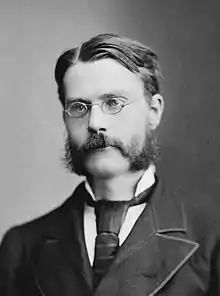Edward S. Holden
Edward Singleton Holden (November 5, 1846 – March 16, 1914)[1] was an American astronomer and the fifth president of the University of California.
Edward S. Holden | |
|---|---|
 Edward Singleton Holden sometime between 1870 and 1880. | |
| Born | November 5, 1846 |
| Died | March 16, 1914 (aged 67) |
| Nationality | American |
| Alma mater | Washington University in St. Louis, B.S. degree; West Point, class of 1870 |
| Occupation | Astronomer, university president, professor of mathematics, librarian |
| Employer | US Naval Observatory, Washburn Observatory at the University of Wisconsin–Madison, Lick Observatory, University of California, United States Military Academy |
| Organization | Astronomical Society of the Pacific |
| Known for | Fifth president of the University of California; discovered 22 NGC objects |
| Parent(s) | Jeremiah and Sarah Holden |
| Relatives | Cousin George Phillips Bond, grandson, inventor Edward Singleton Holden |
| Awards | Member, National Academy of Sciences |
Early years
He was born in St. Louis, Missouri, in 1846 to Jeremiah and Sarah Holden. From 1862–66, he attended Washington University in St. Louis, where he obtained a B.S. degree. He later trained at West Point in the class of 1870.
Career
In 1873 he became professor of mathematics at the US Naval Observatory, where he made a favorable impression on Simon Newcomb. On August 28, 1877, a few days after Asaph Hall discovered the moons of Mars Deimos and Phobos, he claimed to have found a third satellite of Mars. Further analysis showed large mistakes in his observations.[2] He was director of Washburn Observatory at the University of Wisconsin–Madison from 1881 to 1885. He was elected a member of the American National Academy of Sciences in 1885. He discovered a total of 22 NGC objects during his work at Washburn Observatory.
He was president of the University of California from 1885 until 1888,[1] and the first director of the Lick Observatory from 1888 until the end of 1897. He resigned as a result of internal dissent over his management among his subordinates. While at the Lick Observatory, he was the founder of the Astronomical Society of the Pacific and its first president (1889–1891).
In 1901 he became the librarian of the United States Military Academy at West Point, where he remained until his death.
Works
He wrote many books on popular science (and on other subjects, such as flags and heraldry), including science books intended for children, for example:
 Sir William Herschel: His Life and Works, 1881.
Sir William Herschel: His Life and Works, 1881.- The Mogul emperors of Hindustan, A.D. 1398 – A.D. 1707. New York : C. Scribner's Sons. 1895. On the Mughal Emperors.
- Real Things In Nature. A Reading Book of Science for American Boys and Girls, 1916.
Legacy
The asteroid 872 Holda, the crater Holden on the Moon and the crater Holden on Mars are all named in his honor.
Family
His cousin George Phillips Bond was director of Harvard College Observatory. His grandson, also named Edward Singleton Holden, was a well known inventor with numerous patents to his name. He is credited with designing the rolled stainless steel gauge present in most modern fire extinguishers.
References
- Verne A. Stadtman, ed. (1967). "Edward Singleton Holden". Centennial Record of the University of California. University of California. p. 14.
- The Planet Mars: A History of Observation and Discovery. Chapter 5: 1877. University of Arizona Press
External links
| Wikimedia Commons has media related to Edward Singleton Holden. |
 Works written by or about Edward S. Holden at Wikisource
Works written by or about Edward S. Holden at Wikisource- Works by Edward Singleton Holden at Project Gutenberg
- Works by or about Edward S. Holden at Internet Archive
- Works by Edward S. Holden at LibriVox (public domain audiobooks)

- University of California Presidents' biographies
- ASP: Centennial History of the Astronomical Society of the Pacific at www.astrosociety.org Bracher, Katherine: The Centennial History of the Astronomical Society of the Pacific (Mercury Magazine, Sept/Oct 1989)
- Osterbrock, Donald E., The Rise and Fall of Edward S. Holden – Part One, JOURN. HISTORY OF ASTRONOMY V.15:2, NO.43, P. 81, 1984
- National Academy of Sciences Biographical Memoir
- Portraits of Edward S. Holden from the Lick Observatory Records Digital Archive, UC Santa Cruz Library's Digital Collections
- Obituaries
- JRASC 8 (1914) 142
- MNRAS 75 (1914) 264
- Obs 37 (1914) 182 (one paragraph)
- PASP 26 (1914) 77–87
| Academic offices | ||
|---|---|---|
| Preceded by W.T. Reid |
President of the University of California 1885–1888 |
Succeeded by Horace Davis |